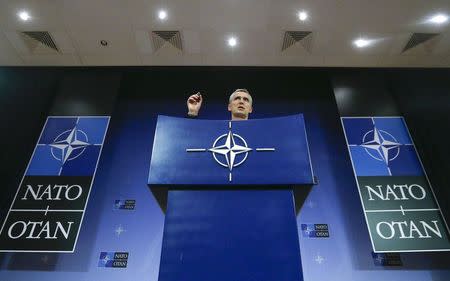Once a target, Montenegro to get NATO invitation to join

By Petar Komnenic and Robin Emmott PODGORICA/BRUSSELS (Reuters) - Sixteen years after NATO bombed Montenegro in the Kosovo war, the Western military alliance is poised to invite the ex-Yugoslav republic to join its ranks over the opposition of Russia which sees its accession as "confrontational". NATO diplomats told Reuters the Adriatic state of 650,000 people will get the green light on Wednesday at a meeting of alliance foreign ministers in Brussels. It will mark the first expansion of NATO ranks into ex-Communist eastern Europe since Montenegro's neighbours Albania and Croatia joined in 2009, and the first since relations between Russia and the West hit a post-Cold War low with the outbreak of war in Ukraine last year. The mountainous country, only slightly larger than the Falkland Islands or Puerto Rico, offers NATO a military of barely 2,000 active members. But its accession, alliance diplomats say, sends a message to Moscow that it does not have a veto on NATO's eastwards expansion. Montenegrin membership, however, is much less contentious than NATO's earlier overtures to former Soviet Georgia, whose own accession ambitions were quashed by war with Russia in 2008. All the same, the Russian foreign ministry said the accession of Montenegro, which has seen an influx of Russian private money, home buyers and tourists since splitting from a state union with Serbia in 2006, would send a "powerful confrontational message". "Not only does it not correspond to the interests of maintaining peace and stability in the Balkans and in Europe as a whole, but it has the potential to complicate even further the already difficult relations between Russia and NATO," ministry spokeswoman Maria Zakharova said last week. Bastian Giegerich of the London-based International Institute for Strategic Studies said that demonstrating NATO's 'open door' policy remains in place was the key political message the decision would send, something welcomed by the United States. "Although, it is difficult to see how the open door today applies anywhere but in the Western Balkans," he added. MONTENEGRINS DIVIDED Montenegrins themselves remain deeply divided over the merits of joining NATO, many still angry over the alliance's 1999 bombing of Serbia to halt the killing and expulsion of ethnic Albanians in Serbia's then southern province of Kosovo. NATO planes also bombed Montenegro, then part of a rump Yugoslavia with Serbia, arguing its targets were part of the war machine. While the Podgorica government resists calls from some opposition parties for a referendum on the issue, NATO diplomats point to polls that suggest public opinion is narrowly in favour of joining. "We are satisfied that the Montenegrin people and their representatives have taken this decision to join," said Washington's envoy to NATO, Douglas Lute. Whether it is decided by a plebiscite or a simple vote in parliament, the process of joining NATO may yet take months. "We risk a lot," said 24-year-old student Milos Rakovic. "Why should we be part of a military alliance whose members are targets of Islamic State? We don't need that." Fifty-two-year-old housewife Stanka Bulatovic said she was "strongly against a military machine that bombed our country in 1999." Others, however, saw little alternative. "We are a very small country and we need some kind of protection," said teacher Milka Radoman, 41. "I think it's only natural to be part of an alliance that gathers our neighbours and EU countries. We are part of Europe and we should naturally go this way." (Additional reporting by Matt Robinson in BELGRADE and Ludmila Danilova in MOSCOW; Writing by Matt Robinson; Editing by Richard Balmforth)

